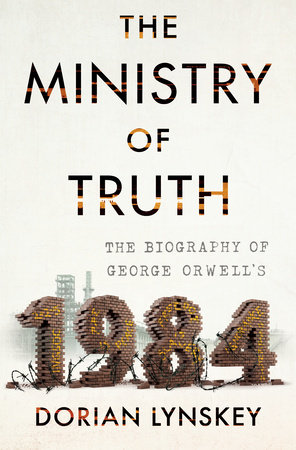Book Review: “The Ministry of Truth” — Writing a Blueprint for Disaster
By Robert Israel
Words from George Orwell to live by: “To see what is in front of one’s nose needs a constant struggle.”
The Ministry of Truth: The Biography of George Orwell’s 1984, by Dorian Lynskey. Doubleday, 368 pages,, $28.95.
 Can you identify this speaker?
Can you identify this speaker?
“You are being watched. The government has a secret system, a machine that spies on you every hour of every day.”
If you answered British novelist and journalist George Orwell you’d be correct.
You’d also be wrong.
In 1984, Orwell wrote about a world where the government conducts a constant hyper-surveillance on its citizens, where posters on every street corner warn: “Big Brother is Watching You.” But the above quotation is not his. It is taken from a popular television program Person of Interest, and the speaker is a fictional character named Harold Finch whose computerized surveillance system spies on the private lives of ordinary citizens.
The television show’s writers credit Orwell. No doubt he’d be amused that they had the temerity to steal it from his novel Nineteen Eighty-Four (1949). (They aren’t the only ones – more on this in a moment). It was in his novel that Orwell created a vocabulary for the linguistic and technological manipulation demanded by authoritarianism: Thought Police. Newspeak. Unperson. 2+2=5. Thoughtcrime. Ministry of Truth.
These terms became almost instantly memorable — Orwellian words/phrases have become part of our everyday lexicon.
Take, for example, President Trump’s press secretary, who, in January, 2017, described the attendance at Trump’s inaugural in Washington, D.C. as amounting to “the largest audience to ever witness an inaugurations – period – both in person and around the world.” In his introduction to his fascinating account of how Orwell came to write his famous novel (completed just before he died), author Dorian Lynsky uses this Trumpy example and writes:
“Asked the justify such a preposterous lie, the president’s adviser describes the statement as ‘alternative facts.’ Over the next four days. U.S. sales of [Orwell’s] book will rocket to almost 10,000 percent, making it a number one-one best seller.”
Orwell is experiencing a resurgence in popularity as readers clamor to understand how language is being corrupted for the purposes of influencing thought for political ends (a task that now occupies legions of newspaper reporters engaged in fact checking Trump’s misstatements/lies).
Orwell, Lynskey documents, found evidence of this rampant corruption of words in the 1930s. His novel lay dormant in his mind for years as he pursued other writing projects (novels, radio scripts, essays). We learn from the author that, when Orwell retreated to an island, seriously ill, to dedicate his last years to writing 1984, he did so in a spirit of uplift. His book on the planned dissipation of language had finally, in his mind, come together after many frustrating years. Other biographers have intimated that Orwell’s final, darkly pessimistic, novel reflects his despair over his failing health. He died of tuberculosis at the age of 46 in 1950. But Lynskey debunks this fantasy — 1984 was written in a sense of triumph. Unruly material had been mastered.

Having lived through World War II, Orwell knew only too well the perils of totalitarianism, its barbarity practiced in both the Nazi Reich and Soviet Russia. While reading Lynskey’s book, I found such an example in a New York Times piece about newly uncovered research gathered by Holocaust survivor and philologist Nachman Blumental. The Times reports that Blumental discovered that the Nazis used German words like “abgang” (exit) or “evakuierung” (evacuation) in their documents. These words, Blumental argues, were “euphemisms for death…the Nazis had used the German language to obscure the mechanics of mass murder and make genocide more palatable to themselves.”
Lynskey’s study is an important contribution to appreciating Orwell’s enduring value. However, in terms of the volume’s prose, best to be warned. His writing is often tedious – Lynskey tried to cram too much into his sentences, to the point that reader will find themselves struggling for breathing room. He documents how Orwell’s themes have influenced countless creative endeavors, from novels such as The Handmaid’s Tale, films like Brazil, graphic novels like V for Vendetta, and David Bowie’s rock album Diamond Dogs. And he succeeds in explaining why so many readers are turning to Orwell now that we are neck-deep in a Trumpy world where dictators like Kim Jung-Un (whose murderous deeds are well-documented) are being so closely embraced in a ironically ‘prettified’ language.
The Ministry of Truth is a revelatory companion to more than just Orwell’s final novel; it gives us a vivid sense of the writer-as-hero, with Orwell laboring on this deathbed to complete a book whose prophetic vision — a blueprint for authoritarian obfuscation, if you will — continues to haunt us.
Words from Orwell to live by: “To see what is in front of one’s nose needs a constant struggle.”
Robert Israel writes about theater, travel, and the arts, and is a member of Independent Reviewers of New England (IRNE). He can be reached at risrael_97@yahoo.com.

